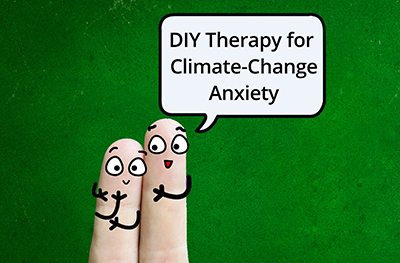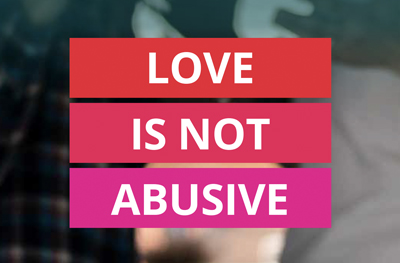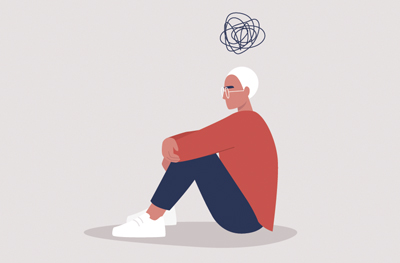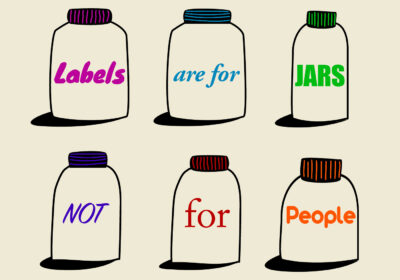Climate change anxiety is a pervasive and troubling form of anxiety, which has much in common with other anxieties fuelled by the constant repetition of threat, whether physical, material, moral, or social. And not only is it experienced, it is acted out in a range of ways that have more than just personal consequences: it also has interpersonal and social consequences.
When anxiety is induced in an individual or population of individuals, such as by media messaging foreshadowing catastrophe, or announcing and effecting significant shifts in the social order, or previously accepted norms of social behaviour, it can take on a particular character. Such anxiety may simmer in the background (rather than bubbling to the surface in ways more common with anxiety), eroding an individual’s wellbeing, and showing itself in fear driven behaviours and a compromised capacity for wholesome interpersonal and social relationships.
As with any affliction, it isn’t useful to try and apply a cure, without first diagnosing the nature of the problem; in this case that will take a bit of patience. However, we can observe other interesting and important things as part of the process.
The nature of anxiety
Threat, whether real, imagined, or contrived, is detected by a part of our brain (called the amygdala) specifically allocated for this purpose (a bit like a smoke detector that warns of potential fire). When it detects threat, it protectively sounds an internal alarm activating a systemic response involving all sorts of changes in our physiology, changes which we bundle up in the term anxiety. It brings about reactions in us (hearkening back to our primitive past) that give us an increased capacity to either try and fight the threat or run away from it (which is why this reaction has been termed the fight or flight response). If our threat detector has become overly sensitised by constant threat messages it may tend to respond increasingly to even vague intimations of threat. This is how anxiety can grow and get quite out of hand.
Anxiety is much more than just a feeling; it is about the protective activation of all our body systems. If switched on for too long, it can be quite toxic and damaging to our bodies and our psychological wellbeing. It can also prompt us to behave in ways that are controlling, defensive, angry, impulsive, unfeeling, and avoidant. It can shift our mood to a bad place and empty life of motivation and meaning. When intense, it constitutes a form of distress that can even lead to suicidal thoughts. In short, anxiety is no small issue and must be taken seriously. It also happens to be the most prevalent mental health issue in our society affecting a huge number of men, women, teenagers and children.
For some people, fight-or-flight anxiety is a constant experience and one that is seriously fatiguing and debilitating. As already intimated, this activity is not always conspicuous, that is, anxiety doesn’t always present outwardly and obviously, it can also be like a constant hum in the background quietly undermining confidence, physical energy reserves, dampening mood, diminishing motivation and giving rise to a pervasive sense of powerlessness.
Understanding that there are real threats and contrived ones
When a threat is real, humans generally have a resilient and creative capacity to respond constructively to it, and one way or another, to deal with it. We have faced wars, natural disasters, and have always had to cope with losses and major challenges of daily life, somehow pushing on, rebuilding, and recovering. But if a threat is embedded in a complex story that we can’t make proper sense of, disentangle ourselves from, or if it is about fears of a future imagined event, or changes overtaking us in which we’ve had no say, we can be left feeling quite powerless.
With anxiety we are vulnerable to the wiles and tyranny of our own imagination, as well as the manipulation of others whom are intent on taking advantage of us. This latter circumstance is what we need to wise up to, because we live in a time of unprecedented multi-media communication and messaging. We are inundated by sources of information pouring in through a range of devices, mediums and means. Human minds and experience have never before been so vulnerable to intentional manipulation and exploitation.
The value of having a filter for understanding, rather than an opinion
If you have been anticipating that this article will assert one of the two polarised opinions on climate change, well, it won’t. If you can hold on a bit longer, we are heading off in a much more useful direction. And to be frank, if you think that complex phenomena like climate change are like the simplistic good-versus-evil myths depicted in movies, then think again. This isn’t just about dumb people versus bright people, good people versus bad people, or deniers versus believers, as we’ve been led to think.
Though the subject of climate change has been simplistically depicted and reported this way, there are actually a range of views on this subject, some of which are quite sophisticated and thoughtful and represent much intellectual and moral reflection and laborious analysis of available evidence—a hugely difficult task even for those with considerable expertise, intellectual and scientific honesty. So straight away, it needs to be said that despite the simple narratives of two opposing views (believers and deniers), this subject is nothing of the kind. What can be said for certain, is that this whole subject has become mired in a veritable swamp of vested political, cultural, and economic interests. It is of course easier simply to believe something rather than having to exercise our own capacity of reason. And we ought not to be fooled by the repertoire of phrases and simplistic explanations handed to us. These are purely intended to tell us what to think, not to actually reason for ourselves.
The other serious problem with simplistic dualisms (and especially in this case), is that a whole lot of other important issues yelling out for attention, get side-lined. The climate change preoccupation has effectively obscured and drawn vast resources and attention away from a whole range of really urgent environmental challenges, such as ground water pollution, plastics in oceans, and the loss of animal habitat, species, and diversity.
Many people once found in solidarity on these issues are now in conflict over climate change, or at least how this subject is being framed. In fact, nobody I know denies that climate change is occurring; the moot point is whether it is being accelerated dangerously by human emissions. It is for each of us to decide thoughtfully on the stance we will assume on this, and not just by discounting one position or the other, but by sensibly filtering out the hysteria, the fear and guilt inducements, and other fingerprints that are evidence of ideology.
What this article aims to do is to provide some cautions about the information and messaging domains, and some means of avoiding pedlars of ideology and propaganda, having a lend of you (a term once in common Australian parlance and used by those who had a nose for the disingenuous). Such cautions can be applied to all suspected ideologies, and there is currently no shortage of them out there demanding public attention and resources. You must come to your own conclusions about the climate change bun-fight, and you need to if you are to put yourself in a position that is healthy and sustainable psychologically. You may need to change your stance if you aren’t to be subject to manipulation and the guilt, panic, and anxiety inducing messaging of ideology.
The new world of social and internet media
Social and internet media have increased our perception of potential threats because of the sheer volume of our consumption of information and messaging. Without even realising it, our threat detection capacity is being expanded, elaborated, and sensitized to a degree that is dangerously unhealthy. Arguably, our cultural trend towards greater subjectivism (feeling centredness and focussed; everything is about my feelings), is also making us more acutely vulnerable to anxiety, in a way that is subtle and largely imperceptible. The very tone of emotional life is shifting, with human resilience (principally in the younger generation) giving way to avoidant escapism, and the demand for safe spaces and trigger warnings, amounting to a strange trend of elective fragility.
You might think that a society so sensitized would be more caring and thoughtful. The reality is, when people are hypersensitive and thus fearful and anxious, they may also exhibit unfortunate tendencies of being irrational, unpredictable, controlling, reactive, angry, self-absorbed, self-centred, hostile, and just plain nasty. While psychologists seem preoccupied with the personal experience of and subsequent therapy for anxiety, its potential behavioural consequences often go unchecked despite being interpersonally and socially ruinous.
A society made fearful and anxious is a society much more susceptible to manipulation; propogandist messages warning of threat can easily begin to saturate and unnerve us, leaving us at the mercy of simplistic (even ridiculous) theories and solutions. Ironically, such theories and solutions, if embraced, provide a sense of solidarity, a modicum of power and pseudo-intellectual status, and depict the propogandists as benevolent. Our current social and cultural context is one of smoke and mirrors, illusions, and a web of manipulative messaging, that goes largely unnoticed, whilst unknowingly permeating all levels of our experience and responses.
Here is a simple quiz for you to do:
The task here is to choose which of the following options is true enough for you to bet your life on:
- Journalists and mass media outlets accurately report facts. They are not representing political, commercial, or ideological interests.
- Politicians act in the public’s best interests. They do not make decisions merely to improve their elect-ability and popularity, and they work for long-term solutions to serious social concerns.
- Academics and academic institutions are trustworthy. They do not pedal ideology or popular cultural whims. They are committed to teaching students how to think not what to think, and they are concerned with noble principles of promoting knowledge, learning, human character, social tolerance and mutuality, and the quality of civic life and society.
- The law and our legal institutions are demonstrably committed to justice for all and equal access to justice for all irrespective of financial capacity or social status.
- The view held by the majority who believe themselves to have the facts on an issue are right to be trusted.
- When a whole government creates a policy on something it can be assured to be trustworthy.
- When international institutions like the World Health Organisation or United Nations assume a stance and make statements on an issue, we can trust they have it right.
I have every confidence that most readers would no more bet their lives on these claims than believe that there are fairies at the bottom of the garden. Most people, educated or not, are level-headed, discerning and not too easily fooled. Why is it then, you might ask, that whole populations of people in the past have been sucked into ideologies like socialism (responsible for immeasurable human suffering and atrocities, and countless millions of deaths)? Disturbingly, a new modern generation of young people, apparently ignorant of history, are again heralding socialism as a worthy utopian aspiration. Yes, it beggar’s belief, but it is also understandable when you consider the nature of ideology (which will be defined a bit more as we go on), which sets out to manipulate, deceive, and exploit people, by very devious and sophisticated means. And it would seem, that having had a liberal university education makes you more not less vulnerable to such deception than individuals grounded in the realities of earning a living, raising families, and seeking to build and enrich human community.
We are also given to believe (by the present-day socialism enthusiasts) that all things past need to be trashed in order to move towards a utopian social order. This of course is straight from the Marxian agenda: pulling down any and all representations of the past in order to clear the decks for a new world order to emerge. Of course, in effect, this means learning nothing from history (including about the terrible crimes of communism and socialism), thus being doomed to repeat the same disastrous mistakes.
Beware of ideologies, and learn to ‘pick them a mile off’
It has been said, that, the only person that is completely wrong is the person that believes they are completely right. ‘We need to become artful in gleaning the truthful core in views of every kind’ (Dom Helder Camara).
To talk of manipulation and propaganda is to identify two of a number of tell-tale characteristics of ideology. I am using here a definition of ideology that is evidenced in a range of ways in our current society and culture. Once you get the hang of what it’s about and are familiar with its core characteristics, you are in a position to take back a good deal of power that you may have unwittingly given away.
Ideologies are cleverly constructed stories or narratives aimed at manipulating people and engineering social change. They are often constructed with language that is newly created or adapted for the purpose (commonly ignoring and distorting language conventions), and intended to sound intellectual, thus discouraging and even preventing a real grasp of what they are saying, or any sort of challenge. As a substitute, they provide emotive slogans, labels, and messages that have nothing to do with explanation, or reason, but are mostly designed to bypass reason (our critical faculties) and instead evoke fear, guilt, moral outrage, hysteria, anger, and reactivity. They are crafted to have us subscribe to the ideology being promoted, and to join others, like modern-day inquisitors, in condemning all those obviously misled and simpleminded people that disagree or choose not to be included in the enlightened group.
Ideology all the time makes the appearance of intelligence and reason but is only concerned with inducing compliance, adherence and participation with as little thought involved as possible. At every turn, it exaggerates and distorts reality to fit its agenda. It cares little for law or natural justice and will ignore both whenever convenient for the purpose of asserting its will. It follows the philosophy: if you will the end, you must, will the means, and the end justifies the means.
One of its main aims is the radical devaluation of thought and thinking, in order to elicit the most basic kind of non-thinking visceral and tribal allegiance. Of course, what feels at first like it has made life so much simpler, and has put one on a superior moral plane, has accomplished not only a clever subjugation of reason, but has reduced a person’s capacity for moral reasonableness to a grunt of compliance and complicity. What pretends to be empowering turns out to be a sticky web of entanglement, that not only perpetuates and justifies anxiety, but can turn it into rage that is aimed at oneself and others.
Ideologies tend to be closed systems where contradictory facts or points of view are not allowed to challenge the central claims of the ideology. A quick retreat into name calling, besmudging another’s character, mocking others as deniers, racists, phobic, out of step with the majority, or casting aspersions on them as less moral or intelligent, are effective (and subjective) strategies for shutting down any meaningful discussion, and demonising anyone daring to disagree.
People do this because they have unknowingly invested themselves so heavily in an ideology, they have become enmeshed in it, and therefore also beholden to it; they have a great deal to lose by admitting doubt, not the least of which is the threat of being ostracised as a traitor, or as a defector to a marginalised and ignorant minority other view.
Ideology invites you to lose yourself in it. To feel like you grasp and can articulate its seeming complexities and to feel included in its overarching sense of rightness and moral superiority. All you need to do is learn and use some of its mantras and slogans. Everyone who shares this language becomes an expert, can sound like an expert, denounce others like a real intellectual activist, yet without really understanding anything of any real substance. This reminds me of some students at university, trying to proselytise others to the cause of the Socialist Worker’s Party. They sounded intellectual, and could rattle off all sorts of slogans, mantras, and esoteric sounding stuff. However, underneath it all was little or no substance, and when challenged about the rather ugly failure of the USSR (which was in the throes of disintegration), they simply didn’t want to know.
Become an ideology spotter
The following check list can be used as a filter by which to sort out what you will or will not attend to, support, and be influenced by. Pick a couple of common cultural causes (that you know are out there) and see how they match up with some of the following hallmark characteristics of ideology:
- You are being encouraged to feel guilt and fear
- Supporters are prepared to defame, demonise, and shut down anyone that disagrees with them
- You experience being silenced and not allowed to have a contrary view
- Supporters show little real interest in discussion, and if their arguments are challenged, they resort to insults, mocking, defamation, and personal attacks
- When presented with facts contrary to their view, they simply discount them by saying, “we don’t agree”, or “your facts are incorrect”, yet they provide no intelligent explanation why
- Supporters are prepared to use the tactic of cancelling others by striking fear in venues, organisations, or groups, prepared to host an airing of their contrary views
- Freedom of speech is openly and unapologetically opposed
- Exaggerated and cherry-picked data are commonly used to compel belief and compliance
- When predictions are made and prove not to be true or accurate, this is simply glossed over, without apology or correction
- Supporters claim to be in the majority in order to marginalise detractors whom they claim to be a fringe minority (or idiot fringe)
- Language has been created or adapted to make ideas sound intellectual and therefore beyond question
- Demands and expectations are imposed on you which you had no part in agreeing to
- Proponents and believers are convinced they are morally superior to others, and that the law and any requirement of natural justice should simply bend to their view, or be ignored
- Manipulative and propogandist messaging are used (emotive words, catch-phrases, and narratives), and vulnerable individuals (like children) are exploited to promote the cause and to by-pass reason in favour of emotional responses such as outrage, fear, guilt, and hatred for detractors
- Common sense is mocked as outmoded and ignorant, reality is distorted to fit with proponents claims and subjective view of truth; my truth and subjectivism replaces any sensible objective notion of truth and reality.
- Proponents tend to be in a constant state of negative projection—denying their own faults and failings by only identifying them in others, whom they condemn
- Proponents assume the simplistic position that, if you aren’t for us, you are against us
- Proponents are prepared to assert their will and views even if this means undermining cultural heritage, economy, community, family, and religious freedom, and trampling on core human values of compassion, mutual respect and consideration, justice, equity, and honesty
So then, what is the cure for climate change anxiety?
You’ll be pleased to know that the cure for climate change anxiety is not some new-fangled psychotherapy or anti-anxiety drug, it consists of adopting some relatively straightforward suggestions and principles. These aren’t complicated and will cost you nothing except a little time and effort. They include the following:
- Ditch the ideology and straight away your anxiety will ease. Ideology lies, it exaggerates, and it intentionally seeks to induce fear and moral outrage; it intentionally masquerades as the only worthy opinion and – authoritative view. It is the purveyor of anxiety inducing threats, and we can well do without it.
- Take back and use your power. We need to recognise and free ourselves from the entangling web of ideology that surrounds even the most noble sounding causes. A useful thing to remember is that, if we don’t use the power that we have, it will very likely fall imperceptibly into the hands of others. Taking back our power and using it, will first mean making a conscious choice to step back, withdrawing our mind from its exposure to and passive acceptance of the relentless, pervasive, and cumulative messaging of ideology.
- Choose self-preserving lifestyle habits. Exercising the power that we have will mean choosing to adopt certain self-preserving lifestyle habits, such as turning off the television and ceasing to use social media except in the most discerning and sparing way. Limit the threat messaging and you diminish your anxiety. This will also give you time to shake free from narratives constructed to engulf your mind; it will give you time to think for yourself. You can then decide which sources of information you tentatively engage with – those least carrying the taint of ideology. You may find yourself having to relinquish even some of the previously most credible and widely respected sources. Here is something radical: try genuinely listening to alternative points of view, and try out the principle cited in the quote from Dom Helder Camara: ‘…become artful in gleaning the truthful core in views of every kind’.
- Step back and give your head a rest. Perhaps more importantly, after stepping back, give your head a complete rest. Social and global issues aren’t going anywhere, and, despite the doomsayers, you won’t suddenly be swept up in a tsunami or an unseasonal typhoon because you take time out to clear your head and give your emotions a rest. But remember, this can’t be done if you permit your exposure to ideological messaging to continue – it is advisable to withdraw at least to the extent that you have some control over it.
- Practice responding rather than reacting. A key principle of self-preservation – and one that can make a real difference in the world (rather than just a noise), is becoming a person that chooses to respond rather than react to others and events. Easier said than done, perhaps, but well worth the effort to practice and learn. Our reactivity (and that of others) simply serves to elaborate and amplify threats, eliciting escalating anxiety. If instead we can remain calm and not get ‘hot under the collar’ (reminding ourselves to respond rather than react), the messaging to our brain changes from yelling threat, to “things are challenging but manageable”, which automatically limits potential anxiety production. Avoiding a needless expenditure of energy in reacting we can conserve our energy for actually constructively dealing with things. Keeping calm also means emanating calm (and calm is infectious), which has benefits beyond ourselves.
- Learn to hold no opinions. Another key principle of self-preservation and a powerful antidote to anxiety, is to hold no opinions. This of course needs an explanation, but it has immediate relevance in our present circumstances of rampant ideology and the polarisation of arguments. To hold no opinions doesn’t mean not having an opinion, rather, it is about whether we are so attached to an opinion that we are invested in the need to be right. The distinction here is critical. If I am not invested in the need to be right and do not hold a tight grip on my opinions, then I will not feel the need to argue, nor will I try and have everyone else agree with me. Incidentally, this will position me perfectly to receive new and relevant information with the potential to reshape and improve the opinions I do have.
- Speak up in the right way. Of course, I can and should speak up when and if it has a constructive purpose. To speak up will mean avoiding language that is divisive, insulting, demeaning, judgmental, or aimed at winning, and instead aiming to leave the way open for dialogue, and mutual respect. Whatever problems exist in the world can be solved and can only be solved when people act with openness and goodwill towards each other, finding common ground and creatively working towards solutions. Nasty divisiveness, disingenuous and manipulative virtue signalling, tribalism, demonising others, name-calling, defaming or seeking to silence and ‘cancel’ others are all the ugly hallmarks of the worst not the best that human nature is capable of.
- Give the truth a chance to emerge. Step back and permit the truth to emerge. Truth is remarkably buoyant; it finds its way to the surface breaking through the most formidable of obstructions and opposition. As Mohatma Gandhi once said, ‘truth has a force that always and inevitably prevails’. However, this doesn’t always happen quickly, yet is more likely to happen as each of us accepts responsibility for not standing in its way by being part of the problem. Again, there is real value in stepping back, and with patience and goodwill, encouraging respectful dialogue.
- Get back to prioritising small scale human values. Reference yourself and your commitments to small scale human values and interpersonal relationships. Ideology masquerades as the greater good, but the greater good is never served by us relinquishing compassion, trampling on other people’s reputations, setting out to damage others, or neglecting to treat others as we’d have them treat us. No cause on earth is worth sacrificing common human decency to.
There is a cure for climate-change anxiety, and the good news is, it is generalisable to other similar ideological infirmities. However, a bit like an anti-biotic, you have to follow through with the whole course of treatment if it’s to have lasting effectiveness. As stewards of this good earth we’ve inherited, could we not get back to taking care of it without losing our way off along a tributary of divisive and toxic ideology? How much better it will all turn out if we can learn to listen to other points of view and find some middle ground, instead of being invested (due to our own insecurities) in the need to be dogmatically right. How much better if we can forge a path cooperatively around whatever it turns out really needs to be done and can be done, to preserve and enhance human existence in whatever harmony is possible with the natural environment.
by John Ashfield PhD
Some key strategies for ‘coming down’ from an acute state of anxiety are detailed in this resource here.






